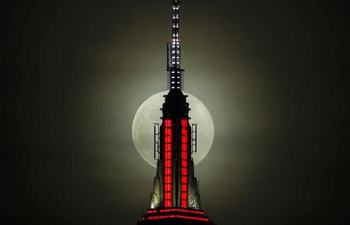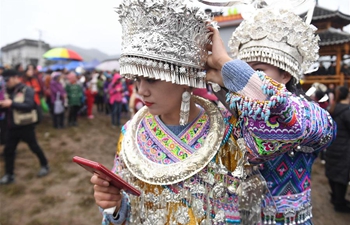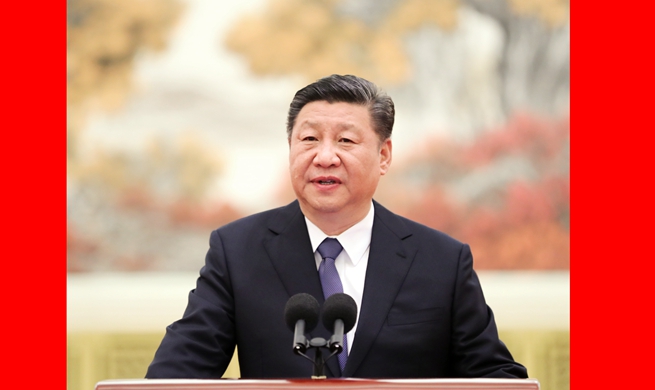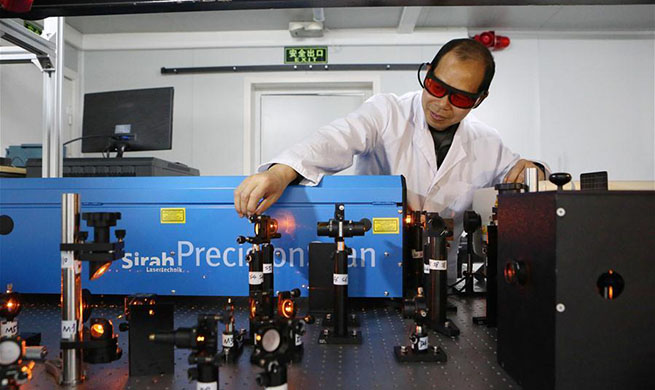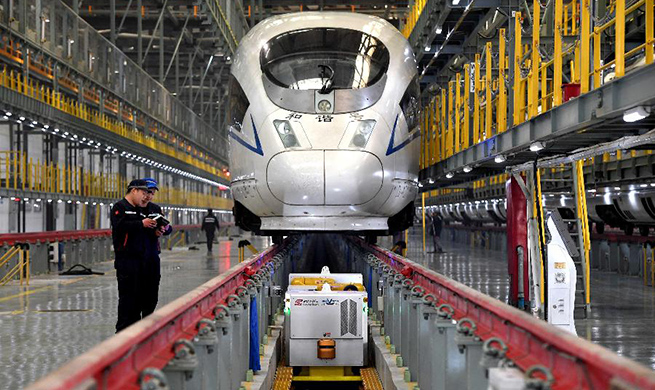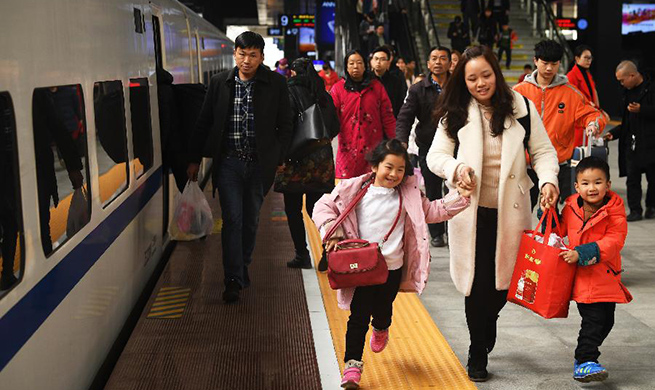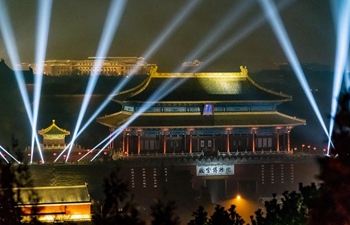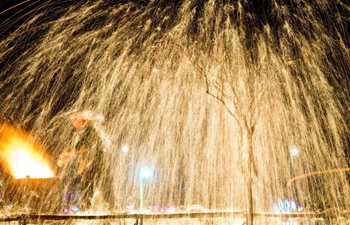by Li Huizi
CHRISTCHURCH, New Zealand, Feb. 21 (Xinhua) -- Eight years ago when residents looked out of their windows in New Zealand's second largest city of Christchurch, many familiar buildings had crumbled in a flash.
A 6.3-magnitude quake struck the city on Feb. 22, 2011, with a depth of only four km. The quake claimed 185 lives spanning more than 20 nationalities, including more than 20 Chinese students.
Then-Prime Minister John Key described the disaster as "New Zealand's darkest day."
The city quickly started reconstruction. A number of Chinese enterprises also started to invest in Christchurch. Christchurch City Councilor Jimmy Chen cited the Huadu International Construction Group as an example, telling Xinhua that over the past five years, the company has played a key role in Christchurch's reconstruction.
CHAOS AND TERROR
Bob Parker, the then Christchurch mayor, said he remembered just how much emotion he had felt in the aftermath of the Christchurch earthquake.
"You just recall the chaos and the terror and the uncertainty of that time," Parker said.
The mayor and city councilors went immediately to the emergency command center nearby. The center was set up less than five months earlier when a 7.1-magnitude earthquake jolted Christchurch in September 2010 and destroyed more than 100,000 houses with no casualties.
The September quake severely weakened the foundations of Christchurch buildings.
International rescue teams arrived within 48 hours after the Feb. 22 quake. The Chinese government dispatched a 10-person search and rescue team which arrived 36 hours after the quake.
The earthquake and aftershocks caused substantial destruction to Christchurch. Statistics showed more than 1,200 commercial buildings were destroyed, and around 90 percent of residential houses were damaged to varying degrees.
It is estimated that the total cost for Christchurch's reconstruction will exceed 40 billion NZ dollars (27 billion U.S. dollars), which equals approximately 10 percent of New Zealand's gross domestic product (GDP).
CITY REGENERATION
Eight years on, people no longer talk about post-quake depression and anxiety, although a lot of people were still frightened and have since moved away. However, some of them later returned.
As for those choosing to stay, couple Mia Zhao and Andy Shiau decided to continue to invest in their four shops in the City Central.
"We want to be part of the regeneration," Andy said, adding that the post-quake reconstruction has turned Christchurch into a new city which is adapting to the future.
He said his cafe, dumpling and sushi shops have all experienced a business boost as more and more people have returned to the central city to live and work.
"It shows the city is optimistic," Mia said.
Hair salon owner Kate Lee said many people chose to leave the city after the quake, but it was more difficult for immigrants to make the decision, as they would need to start over in a new city if they moved away.
"If you love Christchurch, you had to stay as the city needed you," Lee said.
Jonathan Bierwirth, principal of St. Andrew's College Preparatory School, said the Christchurch earthquakes had a significant impact on the city.
"The city center was decimated along with many houses. During this period there were over 13,000 earthquakes and aftershocks, so we were constantly on edge and worried," he said.
"Given the ongoing global natural disasters, I suppose it has become easier to understand, or expect, that this is now a part of living on this planet and these events will continue to happen," Bierwirth said.
"Although Christchurch has not yet fully recovered, we are well on the way," he said, adding that in many cases, the disaster has provided the opportunity to rebuild much of the city's infrastructure and operations to accommodate the changing trends and needs of families living in the 21st century.
"Natural disasters can come at any time, and nowhere is better or safer than anywhere else. Hopefully we have had our turn and the next 50 years will be stable," he said.
Merv Millar, owner of Waipuna Estate, has lived in Christchurch for more than 60 years.
From a business point of view, the city really struggled from a lack of hotel rooms, and the reconstruction brought an opportunity to build more hotels to capitalize on the growth in visitors, recalled Millar.
"After the quakes there seemed to be a much stronger community spirit. There was lots of volunteering to help out and the general consensus was that despite the tragedy we had to get on with life and help those less fortunate. We focused on what was really important in life," said Millar.
NOT VICTIMS
Councilor Chen said, "We are not quake victims. We are a resilient city."
Eight years on, the Christchurch population exceeds 400,000, which was the level before 2011. The birth rate, especially that of local Kiwis, has increased, Chen said.
The city now stresses sustainability, safety, resilience, innovation and inclusiveness.
Chen said Christchurch has headed in a more international direction, with more than 170 ethnic groups living together in the city.
Christchurch also has seven sister cities around the world. The City Council will introduce an international strategy draft later this year to map out the city's global strategy.
The international steps were not halted by the earthquake. After the 2011 disaster, then Mayor Bob Parker visited the city of Guangzhou in south China to discuss opening a direct connection with China Southern Airlines in 2012. On Dec. 16, 2015, the direct flight was officiated between the two cities.
Chief Aeronautical and Commercial Officer at Christchurch International Airport Ltd. Justin Watson said that China Southern Airlines flights brought more tourists to the South Island, invigorating the economy and facilitating the city's reconstruction.
More Chinese enterprises started to invest in Christchurch. Councilor Chen cited the Huadu International Construction Group as an example, saying that over the past five years, the company has played a key role in Christchurch reconstruction.
Councilor Chen said many companies came to Christchurch to seek investment opportunities after the quake, but a lot of them left after seeing the aftermath, but Huadu chose to stay and became one of the largest companies investing in post-quake reconstruction.
According to the center's reconstruction plan, there are 16 key projects, including a brand-new bus hub, world-class cricket stadium and an "innovation area" that have been put into use and more and more companies and stores have returned to the city center.
Restoration work on the Christchurch Cathedral began last year, seven years after it was damaged in the disaster. The 132- cathedral withstood violent earthquakes in 1881, 1888, 1922, 1901 and Sept. 4, 2010. The restoration will cost about 108 million NZ dollars (73.82 million U.S. dollars).
Last October, the new Central Library opened to the public as the old one was severely damaged by the quakes. Current Christchurch Mayor Lianne Dalziel said the high-tech library's opening was "an incredible milestone."
The striking 92 million-NZ dollar (62.90 million U.S. dollars) library holds more than 180,000 printed items and receives more than 3,000 visitors on a daily basis.
Also, in October last year, a new one-stop service was set up to track outstanding post-quake residential insurance claims.
Minister for the Greater Christchurch Regeneration Megan Woods said the Greater Christchurch Claims Resolution Service has been established to provide homeowners a free channel to access impartial pathways to settle their claims.
Last August, the government announced they would pay, in total, around 12 million NZ dollars (8.20 million U.S. dollars) to Christchurch homeowners who have uninsured properties in the residential red zone.
More than 100 uninsured homeowners will be paid 100 percent of their property value dating back to 2007-2008, according to Woods.
